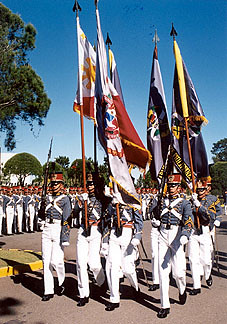 MANILA, Philippines -- Cadet 1st Class Marc Anthony Romero of the “Maragtas” Class of 2007 etched a place in Philippine Military Academy history by becoming only the third graduate of a three-generation PMA family.
MANILA, Philippines -- Cadet 1st Class Marc Anthony Romero of the “Maragtas” Class of 2007 etched a place in Philippine Military Academy history by becoming only the third graduate of a three-generation PMA family.His grandfather, Brig. Gen. Antonio Romero, was a member of Class 1941.
His father, Armed Forces of the Philippines Vice Chief of Staff Maj. Gen. Antonio L. Romero II, belongs to Class 1974.
On Monday, it was Marc’s turn to graduate from the academy and join the Philippine Army.
A former PMA superintendent, retired Maj. Gen. Rodolfo Estrellado says that of the approximately 8,000 graduates since 1905, there have only been two families with genealogical succession involving three generations of PMA graduates.
“It occurred first in 1981 when Natalio Ecarma III, the son of Rodolfo Ecarma of Class 1954 and grandson of Natalio Ecarma Sr. of Class 1923, graduated. It occurred again in 1986 when Paulino Dumlao, son of Jose Dumlao of Class 1951 and grandnephew of Armando Dumlao of Class 1917, graduated from the PMA. This is only the third instance, with Cadet Romero, that the PMA shall have a third generation graduate.”
2nd generation grads
Second generation graduates were more common in the academy.
Estrellado says that there were 131 fathers and sons who graduated from PMA. Given this number, it is safe to assume that there has been one in every batch.
In addition, there were seven families with four siblings who had graduated. The Andayas, Arevalos, Brawners, Maligaligs, Manlongats, Villacortes and Vinoyas.
There were also 24 families with three siblings belonging to the long gray line.
The experience of being in the academy from one generation to another has been both similar and different in the ways that matter.
Romero II says that during his time in the academy, he could not discuss military matters with his father who was in fact already retired.
“It just was not discussed. Maybe it was because he was still a part of the old school,” Romero II says.
“I remember writing a letter to my mother one time, telling her about the time I received punishment for an infraction. My father wrote me back to say that I should refrain from writing those kinds of letters to my mother because it put her in tears. From then on, I never wrote about those things again.”
Family support
The younger Romero has, on his own, decided to spare his mother from the details of his difficulties.
“He doesn’t discuss those things with us,” his mother Bechie says. However, the cadet shares an specially close bond with his parents -- ties that, he himself says, helped him during his toughest days in the academy.
“My family has always been there for me and I am able to discuss my problems with them openly. In my first two months here I really just wanted to go home. When my parents came for my incorporation into the academy, I wanted to just quit and go back to Manila with them,” he says.
In the end, his parents gave him the support that he needed to hang on and after his “Beast Barracks” days (the two-month period prior to his incorporation into the academy) there was no turning back for him.
“The biggest difficulty is being separated from your loved ones and having hardly any contact with them,” he says. In the first year, cellular phones were not allowed and you were only permitted a limited time to use the pay phone to call long distance.
“You adjust eventually,” Romero adds.
Pressure
He had entered the PMA at the age of 20, after spending two years at University of Santo Tomas where he was majoring in Electronics and Communications Engineering.
Is life harder in the academy for a second or third generation cadet?
Estrellado explains that the pressure on the children of cavaliers came mostly from upper classmen giving them more challenges.
“Knowing that I was my father’s son really pushed me to do my best because I did not want to let my family down,” says Romero.
Published on page 1 of the Philippine Daily Inquirer, March 21, 2007





No comments:
Post a Comment